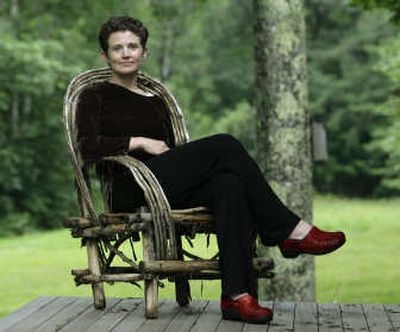Chaplain at the scene

LINCOLNVILLE, Maine – Personal tragedy set Kate Braestrup on her path to ministry.
Her husband, Maine State Police Trooper Drew Griffith, was killed in 1996 when a truck slammed into his cruiser about a mile from home, leaving Braestrup to raise their four young children by herself.
Although he was 15 years from retirement, Griffith’s long-term plan was to attend seminary and pursue a second career as a minister. Braestrup took on that dream and went on to become chaplain of the Maine Warden Service, helping people who find themselves in the midst of sudden tragedy not unlike her own.
The 45-year-old Braestrup shows up at the scene of drownings, snowmobile crashes and search-and-rescue efforts for hunters and hikers lost in the woods, comforting survivors and sometimes the wardens themselves.
She calls what she does “a ministry of presence,” or as she writes in her new memoir, “Here If You Need Me” (Little Brown, $23.99), the job “requires me mostly to just show up, shut my mouth and be.”
A trim, vivacious woman with curly brown hair and gray-green eyes, Braestrup said her entry into the clergy and law enforcement was an outgrowth of her husband’s death.
“I didn’t ask for the experience and I wouldn’t wish it on anyone, but it happened and it became something you could turn into a blessing,” says Braestrup, who has remarried and lives with her new husband, her four children and his two.
Religion had played little part in Braestrup’s life while growing up in Washington, D.C. Her father, a journalist, was nominally Lutheran but didn’t attend church; her mother was, at most, agnostic.
When she and Griffith were married by a Methodist minister in the Roman Catholic chapel at Georgetown University, her alma mater, Braestrup says, “it was the first overtly religious service I actually participated in.”
Two years after her husband’s death, Braestrup entered Bangor Theological Seminary and went on to be ordained as a Unitarian Universalist minister. During her studies, she gravitated to law enforcement, riding on patrol with members of various police agencies as part of an independent study of the spiritual dimensions of police work.
Instead of landing a police job, Braestrup was hired six years ago by the warden service. As one who doesn’t hunt or fish, she had only a limited idea of what wardens did and wondered why they might need a chaplain.
“I might have asked the same question folks so often ask of me: What does a warden chaplain do? Bless the moose?” she writes.
Wardens are usually first on the scene at drownings, hunting accidents, snowmobile crashes and searches for lost hikers in Maine’s vast backcountry, and they had pushed to get a chaplain, she said.
“They said the people at the scene deserve a higher standard of care than we can give them,” she recalls.
Although she is not a sworn officer and carries no weapon, Braestrup delights in the uniform she wears when headed out in the field.
Her green warden service jacket and cap are embroidered with the word “Chaplain.” Under the high-buttoned collar of her black shirt, she slips a piece of white vinyl – a Roman collar of sorts – that identifies her as clergy, but that she can easily pop off when dealing with a non-Christian or someone who has had a bad experience with religion.
The dive team, whose grim task is to search for bodies that may have lain unrecovered for weeks or months, is a particular focus of her work.
“We dive in flood-stage rivers, we dive under the ice, we dive in cold, dark waters,” says Capt. Joel Wilkinson, the team’s leader. “Kate provides the liaison to the family that allows the divers to focus on the job at hand.”
In addition to serving as a buffer for distraught friends and relatives, Braestrup meets with team members after they’ve completed their dives to talk through the experience and help them deal with the stress that accompanies their work.
She also does educational work, instructing wardens and police about how to perform death notifications and deal with grieving survivors.
And yes, she did on one occasion bless a moose.
It happened when she was in Presque Isle and arrived at the scene of one of Maine’s all-too-frequent car-moose collisions. The motorist was unhurt, but the big animal was mortally injured.
At the driver’s behest, Braestrup placed her hand on the moose as it raised its head and then died.
“I said this little prayer, and then I thought, ‘Oh my God, I just did last rites on a moose! ”